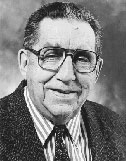Willard Munger
| Willard Munger | |
|---|---|
 |
|
| Member of the Minnesota House of Representatives from the 59, 59B, 7A district |
|
|
In office 1955-1965 |
|
|
In office 1967-1999 |
|
| Personal details | |
| Born | January 20, 1911 Fergus Falls, Minnesota |
| Died | July 11, 1999 (aged 88) Duluth, Minnesota |
| Political party | Minnesota Democratic-Farmer-Labor Party |
| Spouse(s) | Martha Winter, Frances Hotch |
| Children | Two |
| Alma mater | University of Minnesota |
| Occupation | business owner, legislator |
Willard M. Munger, Sr. (January 20, 1911 – July 11, 1999) was a Minnesota politician and a member of the Minnesota House of Representatives from northeastern Minnesota. First elected in 1954, he was re-elected to four more terms before running for the Minnesota Senate in 1964. Unsuccessful in that bid, he ran for the House again in 1966, and was re-elected every two years until his death in 1999. He holds the record as the longest-serving member of the House at over 42 years and seven months.
Munger was born in Fergus Falls and attended Fergus Falls High School, graduating in 1932. While still in high school, he supported the openly socialist Nonpartisan League. Nonpartisan League founder Arthur C. Townley became a close friend. He also campaigned for Farmer-Laborer Governor Floyd B. Olson, a confessed radical who had Nonpartisan League roots. He attended the University of Minnesota and settled in Duluth, where he was a motel owner and operator for many years.
Before serving in the legislature, Munger worked with the marketing division of the Minnesota Department of Agriculture, and with grain inspection for the Minnesota Railroad and Warehouse Commission. He was unsuccessful in his first bid for office in 1934 when he ran for the state House on the Farmer-Laborer party ticket. Later, he was active in the establishment and development of the Lake Superior Zoo.
A Democrat, Munger represented the old districts 59, 59B and 7A in the House, with the district boundaries and numeration changing somewhat through redistricting every ten years. As the legislature was officially non-partisan until the 1974 elections, he caucused with the Liberal Caucus until declaration of party affiliation became a prerequisite for candidacy. His district included portions of St. Louis County, primarily centered around the western part of the city of Duluth.
...
Wikipedia
